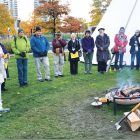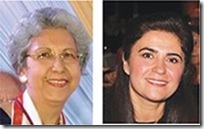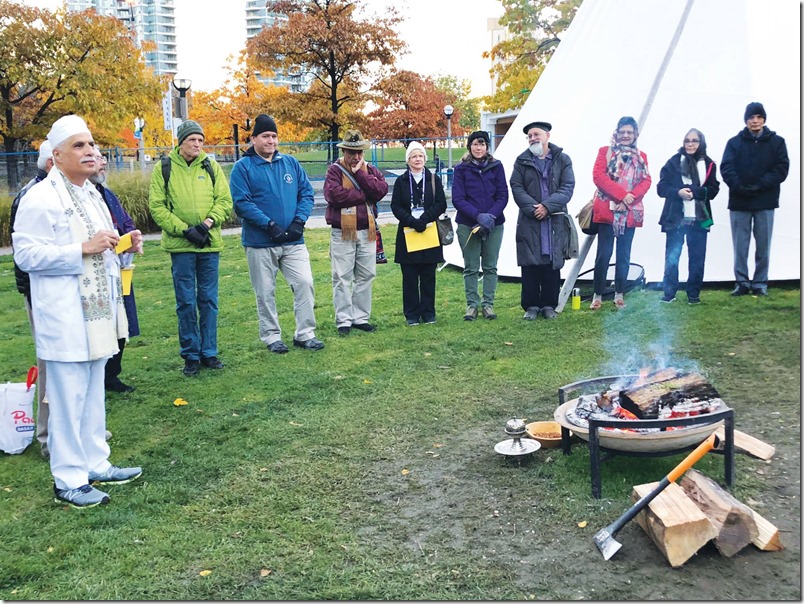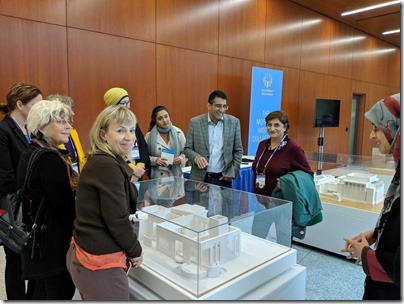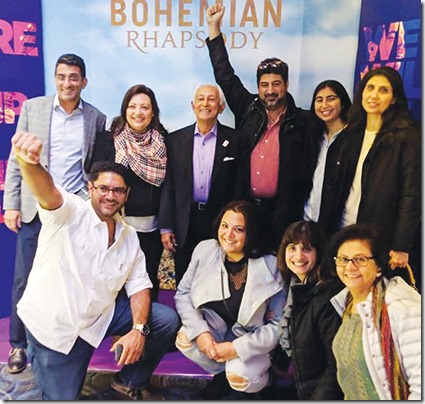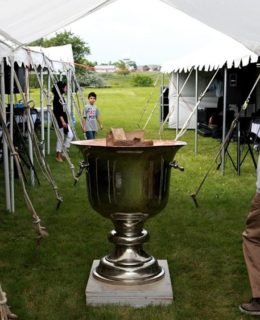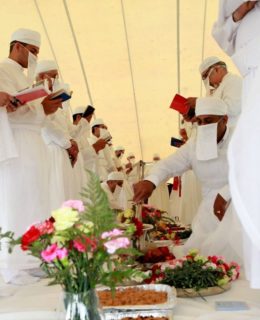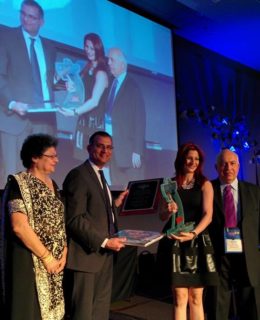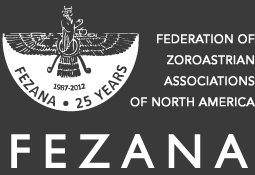A contingent of 51 Zoroastrians participated in the Seventh Parliament of the World’s Religions in Toronto
Young village girls in western India are far better off today than before Armene Modi began her life’s work outside Poona. Rather than face the prospect of having to exit school by class seven and take on work in the fields and eventually becoming young subservient brides, Modi’s work has helped to transform their lives.
The original article written by Jim Engineer was published in the Parsiana magazine edition of January 21, 2019 and is published here with prior permission.
On the other side of the world in the United States, young Payam Khosravi defies expectation by offering a window into his life struggle on the autism spectrum and delivering a global message of inclusion through his mother Parisa and the wonder of modern technology. As CNN’s senior vice president of international news gathering, Parisa Khosravi would bring the most pivotal news into living rooms around the world.
Armene Modi (l); Parisa Khosravi Photo: Jasmine D. Driver
Modi and Khosravi, both women and both Zarathushtis, were prominent plenary speakers at the Seventh Parliament of the World’s Religions (7PoWR) from November 1 to 7, 2018 in Toronto. Parliament trustee and former president of the Federation of Zoroastrian Associations of North America (FEZANA), Dr Dolly Dastoor was responsible for the Zoroastrian presence at the Parliament, an effort that had been years in the making. Her goal: to organize and effectively represent Zoroastrians on the world stage, and to serve as the bridge between the Parliament and the Zoroastrian religion, fostering goodwill, the opportunity to present powerful stories and compelling speakers, and to showcase the ancient religion alongside the world’s major religions in the packed exhibit hall.
Ervad Tehemton Mirza (far l) performing boi ceremony Photos: Jim Engineer
Working alongside Dr Ardeshir Irani, co-chair of FEZANA’s Interfaith Activities Committee, Dastoor sought to elevate and impact the Zoroastrian presence at the Parliament. The result was a contingent of approximately 51 Zoroastrian speakers, attendees and exhibit volunteers representing the faith and educating fellow participants on Zoroastrianism. Speakers would stand out by offering powerful life examples, promoting love, inclusion, hope, education, gender equality and empowerment, in line with the Parliament theme: “The Promise of Inclusion, the Power of Love: Pursuing Global Understanding, Reconciliation and Change.”
“The Parliament offers programming for all, from scholars and activists to families and children, lectures to interactive cultural experiences,” noted the website parliamentofreligions.org. More than 500 programs and events were included across six major tracks: dignity of women; countering war, hate and violence; climate action; indigenous people; next generation; justice. The organizers had estimated a presence of “over 10,000 persons of faith and conscience from 80 nations and more than 200 unique spiritual backgrounds.”
Cyrus Rivetna (far r) explaining model of atash kadeh;
Zoroastrians participated in a total of 16 presentations as individuals or panelists. Besides exhibit booths that offered insights into the Zoroastrian religion and lifestyle, as part of the Sacred Spaces exhibit, Cyrus Rivetna explained a model of the upcoming atash kadeh in Houston. The Sacred Spaces excursion to local places of worship included a visit to the Zoroastrian Society of Ontario’s Mehraban Guiv Darbe Mehr. While Ervad Tehemton Mirza performed the fire (boi) and water purification ceremony at Olympic Park, Ervad (Dr) Jehan Bagli and Mobedyar Guloo Austin performed the jashan ceremony. Monajats sung by a Zoroastrian choir and the screening of On Wings of Fire provided auditory and visual inputs.
Fittingly, the Parliament’s timing coincided with the premier of the blockbuster movie Bohemian Rhapsody, in Toronto on November 2, and created a broader cultural backdrop and focus on Zoroastrians, and Parsis in particular. The movie chronicles the life of Queen lead singer Freddie Mercury, spotlighting his upbringing from Zanzibar to southeast London, and onward to stardom and legendary status as one of the world’s best known vocalists.
Jubilant FEZANA members after viewing Bohemian Rhapsody
Winsome women
Khosravi’s remarks at the plenary session inspired the audience of more than 1,000 attendees and introduced many to Zoroastrianism for the first time: “As a journalist and a news executive, in my 28 years at CNN I had the awesome responsibility of covering and watching history from the front row seat. I directed the coverage of countless historic events, from the fall of the East Bloc, to the genocide in Rwanda, the tsunamis in Southeast Asia and Japan, to the earthquake in Haiti and the Arab Spring. I have had the opportunity to travel the world over and over again, meet popes and presidents, and everyday people and seen so much of humanity’s best and worst. It was humbling, sobering and full of life lessons.”
Her current preoccupation, however, has been far more personal as she works with Payam (fittingly meaning “message” in Farsi) to share his message of love and inclusion. “Payam is a teenager, he is on the autism spectrum and he is non-speaking. A couple of years ago, at the age of 14, we finally had a communication breakthrough. Payam is now essentially spelling to communicate, he expresses his thoughts letter by letter by pointing to an alphabet board,” said Parisa, sharing some of his insightful and touching messages with the audience. She wrapped up her speech by quoting Payam: “My dream is for the entire world to abolish the pain those experience from unnecessary judgments because of each person’s unique differences. People need to recognize how their attitudes are negatively impacting our growth for humanity as a whole.” She received a standing ovation and inspired many questions about Zoroastrianism from Parliament attendees in the days that followed.
In the session tackling the issue of gender inequality around the world, Modi’s inspirational story of empowering young village girls took center stage. Backed by a recent research scholarship from the Brookings Institute, a leading Washington, D. C. based think tank, and profiled on the global stage as a recipient of the CNN IBN Real Heroes Award, Modi is a social advocate and an agent of change whose story captivated the Parliament.
Her organization, Ashta No Kai in India, was established in October 1998 with a desire to improve the quality of life for women and girls in India’s underdeveloped rural areas. Ashta No Kai which means “For a Better Tomorrow” in Japanese, has successfully transformed the lives of thousands of women and girls in 10 villages in the Shirur taluka of Poona district by presenting them with opportunities that their mothers and grandmothers would never have dreamed of.
More than 10,000 women have benefitted from the Ashta No Kai commitment to education, literacy, financial independence and social justice. The resulting increase in confidence levels has given rural women a significant voice in their communities. Moreover, the lives of hundreds of rural girls have been transformed, thanks to Ashta No Kai innovative strategies like the Bicycle Bank, Life-skills Education and Scholarship program.
“Each year, 12 million girls are married before the legal age of 18. In India, the obsession with marriage as the end goal of a girl’s life is a widely accepted practice with the result that 27% of girls in India are married before their 18th birthday. India, in fact, has the largest number of child brides in the world — one-third of the global total,” Modi’s powerful remarks pointedly shed light on India’s child marriage problem.
Child marriage has devastating consequences. Besides denying girls a right to a childhood and putting them at an increased risk of experiencing violence, it perpetuates patriarchy, gender inequality and poverty. It deprives girls of their rights to health, education and opportunity. It compels them to sacrifice the social support and autonomy they need to promote their well-being, explore their potential and lead a life of dignity, she elaborated.
Both Modi and Khosravi showed how Zarathushti leadership in the world is advancing our collective moral compass. Moreover, their stories focused on empowering the disadvantaged, the voiceless, who deserve a helping hand and a chance to be included as the gaps between the fortunate and unfortunate continue to widen.
Bridging the gap
The Parliament experience for me was an awakening and an affirmation. I had first attended and represented Zoroastrians in the next generation plenary of the 1993 PoWR in Chicago. The 1993 Parliament marked 100 years since the first Parliament was held in 1893 at the World Columbian Exposition on the shores of Lake Michigan in Chicago.
I had many questions on what the Parliament as an organization had done to affect change in a world where so many of our conflicts are tragically waged in the name of religion. What had previous Parliaments accomplished? Is the interfaith movement relevant? Does it carry any weight on the world stage? Does it have the power to advance the messages it promotes and to ultimately effect positive change?
7PoWR helped bridge the gap for me and showed just how important a role the Parliament has in educating and inspiring. Nothing is more powerful than watching a speaker who leads by example. Both Modi and Khosravi are shining ambassadors, Zarathushti women who have gone beyond the confines of our vibrant community to be the change they wish to see in the world. Their mission and purpose remind that each of us has the power to make a difference, and that so much more work is yet to be done.

